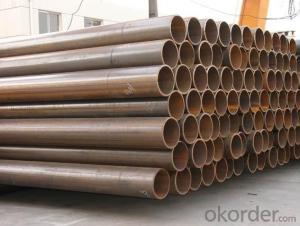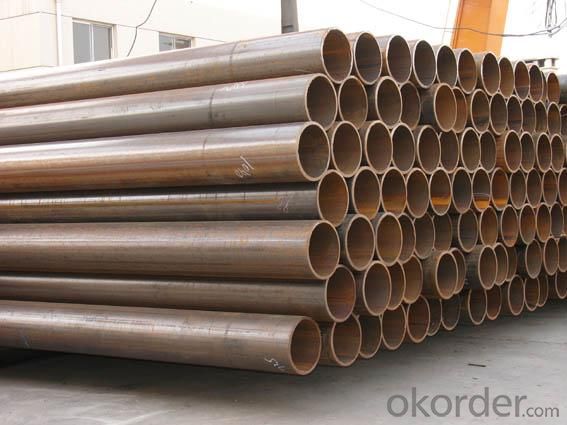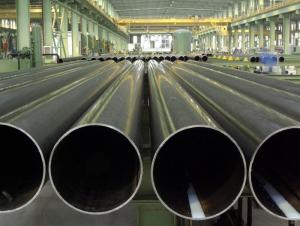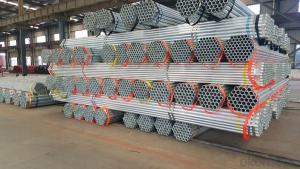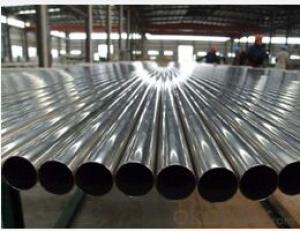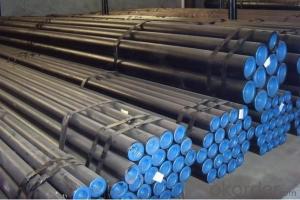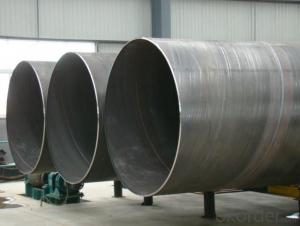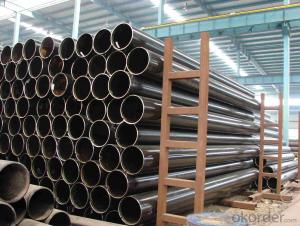Welded steel tube production serious
- Loading Port:
- Tianjin
- Payment Terms:
- TT OR LC
- Min Order Qty:
- 25 m.t.
- Supply Capability:
- 8000 m.t./month
OKorder Service Pledge
OKorder Financial Service
You Might Also Like
1、Structure of Welded steel tube ASTM A106/53 Description:
Welded steel pipe is formed by drawing a solid billet over a piercing rod to create the hollow shell. As the manufacturing process does not include any welding. We are trying to be No.1 pipe and tube material supplier in the world and that's what we are doing now.
2、Main Features of the Welded steel tube ASTM A106/53:
• High manufacturing accuracy
• Power strength
• Small inertia resistance
• Strong heat dissipation ability
• Satisfied price
3、Welded steel tube ASTM A106/53 Images:
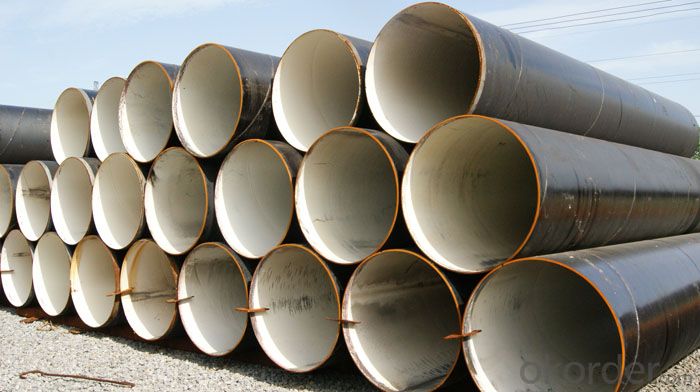
4、Packaging & Delivery
Packaging Details: | seaworthy package,bundles wrapped with strong steel strip |
Delivery Detail: | 15-30days after received 30%TT |
5、Welded steel tube ASTM A106/53 Specification:
Standard | GB, DIN, ASTM |
Grade | 10#-45#, 16Mn |
Thickness | 8 - 33 mm |
Section Shape | Round |
Outer Diameter | 133 - 219 mm |
Place of Origin | Shandong, China (Mainland) |
Secondary Or Not | Non-secondary |
Application | Hydraulic Pipe |
Technique | Cold Drawn |
Certification | API |
Surface Treatment | factory state or painted black |
Special Pipe | API Pipe |
Alloy Or Not | Non-alloy |
Length | 5-12M |
Outer Diameter | 21.3-610mm |
Grade | 20#, 45#, Q345, API J55, API K55, API L80, API N80, API P110, A53B |
Standard | ASME, ASTM |
1.Material:20#(ASTM A 106/A53 GRB.API5LGRB,GB),45#,16Mn,10#.
2.Specification range:OD:21.3-610mm,WT:6-70mm,length:6-12m or according to the requirement of clients.
3.Excutive standards:GB,ASME API5L.ASTM A 106/A53,Despite of the above standards,we can also supply seamless steel pipe with standard of DIN,JIS,and so on,and also develop new products according to the requirements of our clients!
4.Surface:black lacquered,varnish coating or galvanized.
5.Ends:Beveled or square cut,plastic capped,painted.
6.Packing:bundles wrapped with strong steel strip,seaworthy packing.
6、FAQ of Welded steel tube ASTM A106/53:
①How is the quality of your products?
Our products are manufactured strictly according to national and internaional standard, and we take a test
on every pipe before delivered out. If you want see our quality certifications and all kinds of testing report, please just ask us for it.
Guaranteed: If products’ quality don’t accord to discription as we give or the promise before you place order, we promise 100% refund.
②How about price?
Yes, we are factory and be able to give you lowest price below market one, and we have a policy that “ for saving time and absolutely honest business attitude, we quote as lowest as possible for any customer, and discount can be given according to quantity”,if you like bargain and factory price is not low enough as you think, just don’t waste your time.Please trust the quotation we would give you, it is professional one.
③Why should you chose us?
Chose happens because of quality, then price, We can give you both. And we have professional engineering and sales team and professional cooperators and partners. Additionally, we can also offer professional products inquiry, products knowledge train(for agents), smooth goods delivery, exellent customer solution proposals.Our service formula: good quality+good price+good service=customer’s trust
SGS test is available, customer inspection before shipping is welcome, third party inspection is no problem.
Any question, pls feel free to contact us !
- Q: What is the standard length of steel pipes?
- The standard length of steel pipes varies depending on the industry and application, but common lengths range from 10 to 40 feet.
- Q: What are the common fittings and accessories used with steel pipes?
- Some common fittings and accessories used with steel pipes include couplings, elbows, tees, reducers, flanges, and valves. Additionally, accessories such as pipe hangers, brackets, clamps, and gaskets are often used to support and secure the pipes.
- Q: Can steel pipes be used for underground water supply systems?
- Yes, steel pipes can be used for underground water supply systems. Steel pipes are durable, strong, and can withstand harsh conditions, making them suitable for underground installations. Their corrosion resistance properties and ability to withstand high pressure make them a reliable choice for transporting water underground.
- Q: What is the difference between steel pipe and ductile iron pipe?
- The main difference between steel pipe and ductile iron pipe lies in their composition and properties. Steel pipe is made from a combination of iron and carbon, while ductile iron pipe is made from iron with added graphite and other elements to enhance its strength and ductility. Ductile iron pipe is typically stronger and more flexible than steel pipe, making it better suited for applications where durability and resistance to external forces are important. Additionally, ductile iron pipe is less susceptible to corrosion compared to steel pipe, making it a preferred choice in environments with high moisture or corrosive elements.
- Q: What are the factors to consider when selecting steel pipes for a specific application?
- When selecting steel pipes for a specific application, several factors need to be considered. The key factors include the required strength and durability, corrosion resistance, temperature and pressure requirements, size and dimensions, cost considerations, and compatibility with other materials or systems. Additionally, factors such as the intended environment, installation requirements, and regulatory compliance should also be taken into account to ensure the optimal selection of steel pipes for the particular application.
- Q: Can steel pipes be used for transporting gases?
- Yes, steel pipes can be used for transporting gases. Steel pipes are commonly used for gas transportation due to their high strength, durability, and resistance to corrosion. They can effectively withstand high pressure and temperature conditions, making them a reliable choice for gas transmission systems.
- Q: How are steel pipes insulated for thermal efficiency?
- Steel pipes are insulated for thermal efficiency by applying a layer of insulating material, such as mineral wool or foam, around the pipe. This insulation helps to reduce heat transfer and prevent energy loss, ensuring that the pipes maintain the desired temperature and improve overall thermal efficiency.
- Q: How are steel pipes used in the construction of water supply systems?
- Steel pipes are commonly used in the construction of water supply systems due to their durability, strength, and resistance to corrosion. They are used for transporting water from sources such as reservoirs and wells to treatment plants, and then distributing it to homes, buildings, and other structures. Steel pipes are also used for transporting wastewater and sewage. Their ability to withstand high pressure and extreme weather conditions makes them ideal for ensuring a reliable and long-lasting water supply infrastructure.
- Q: How are steel pipes inspected for quality?
- Steel pipes are inspected for quality through a rigorous process that involves various techniques and standards. One common method is visual inspection, where trained professionals examine the pipes for any visible defects such as cracks, dents, or surface irregularities. This visual inspection ensures that the pipes meet the required specifications and are free from any visible flaws. Additionally, non-destructive testing (NDT) methods are employed to evaluate the internal and external quality of the steel pipes. One widely used NDT technique is ultrasonic testing, which involves sending ultrasonic waves through the pipes to detect any internal defects or inconsistencies in the material. This method can identify issues like wall thickness variations, inclusions, or weld defects that may compromise the pipe's integrity. Another popular NDT technique is magnetic particle inspection, which uses magnetic fields and iron particles to identify surface cracks or flaws in the steel pipes. This method is particularly effective for detecting defects in ferromagnetic materials and can be performed on both the outside and inside surfaces of the pipes. Furthermore, hydrostatic testing is often conducted to evaluate the pipes' strength and resistance to pressure. In this process, the pipes are filled with water or another suitable fluid and subjected to a specified pressure to check for leaks or structural weaknesses. This test helps ensure that the pipes are capable of withstanding the intended operational conditions without failure. In addition to these techniques, various quality control measures are implemented throughout the manufacturing process, including material traceability, dimensional checks, and chemical composition analysis. These measures help guarantee that the steel pipes meet the required standards and specifications, ensuring their quality and reliability. Overall, the inspection of steel pipes for quality involves a combination of visual inspection, non-destructive testing methods, and quality control measures. These comprehensive procedures help identify any defects, inconsistencies, or weaknesses, ensuring that the pipes meet the necessary quality standards and are fit for their intended purpose.
- Q: Are steel pipes suitable for use in nuclear power plants?
- Yes, steel pipes are suitable for use in nuclear power plants. They are commonly used in various applications within the plants, including cooling systems, steam generation, and transporting fluids. Steel pipes offer excellent strength, durability, and resistance to high temperatures and pressures, making them ideal for handling the demanding conditions present in nuclear power plants. Additionally, steel pipes can be designed to meet the specific requirements of nuclear applications, ensuring their safety and reliability.
Send your message to us
Welded steel tube production serious
- Loading Port:
- Tianjin
- Payment Terms:
- TT OR LC
- Min Order Qty:
- 25 m.t.
- Supply Capability:
- 8000 m.t./month
OKorder Service Pledge
OKorder Financial Service
Similar products
Hot products
Hot Searches
Related keywords
